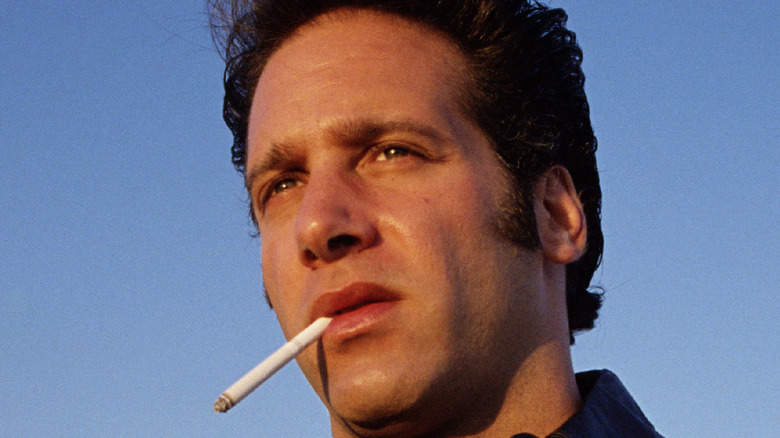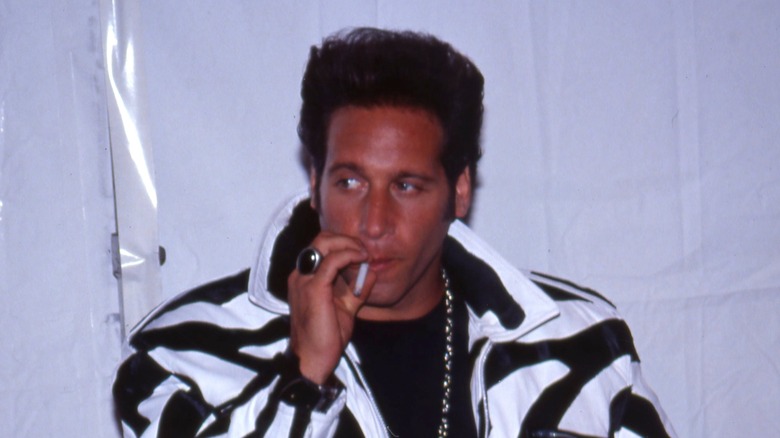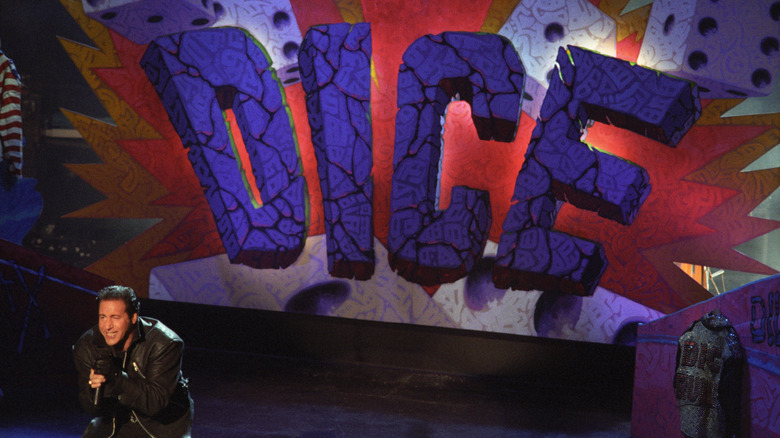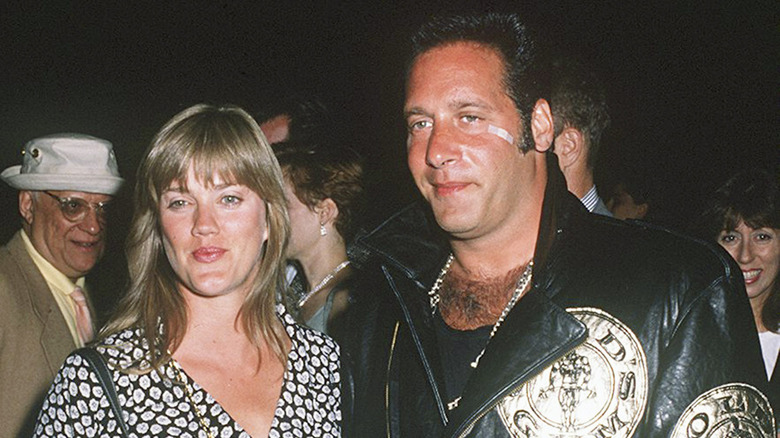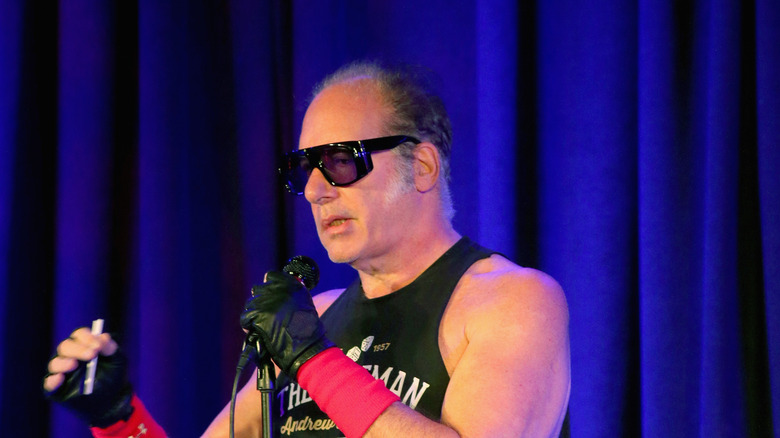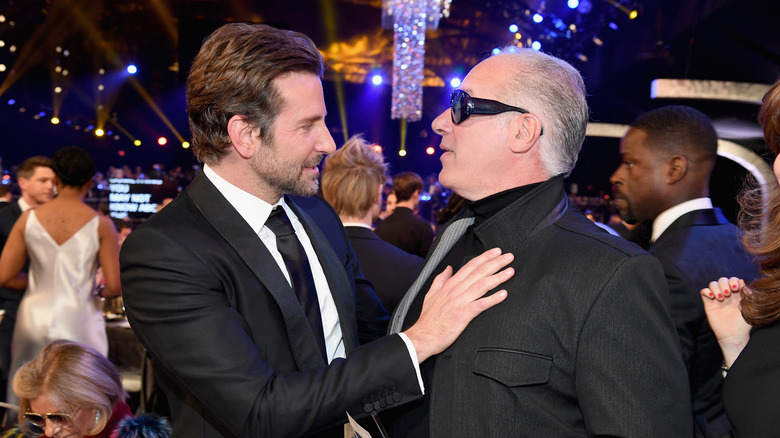The Untold Truth Of Andrew Dice Clay
There might not have been a comedian who shot higher to the stars and fell faster from his peak than Andrew Dice Clay. At the height of his career, Clay surpassed every comedian of his or any era, selling out stadiums, clubs, and albums at an unprecedented rate. At the same time, Clay found himself in the scope of many in the public who viewed his standup as inappropriate, similar to controversial comedians such as George Carlin, Lenny Bruce, and Redd Foxx.
As told by Comedy History 101, shortly after Clay reached his peak in the 1980s with his alter persona, "The Diceman," his star began to fall as activists and other entertainers criticized his act for being racist, misogynistic, and homophobic. When the star comedian attempted to push back at the criticism, as well as try to expand into cinema failed, "The Diceman's" 15-minutes of fame were up. Today, Clay may not seen on the same level as contemporaries such as Eddie Murphy and Bill Hicks. However, a film renaissance in the latter half of the 2010s renewed interest in Clay.
Andrew Dice Clay's Influences and Creating "The Diceman"
Before the slicked-back hair, black leather jackets, and screaming fans/protesters, Andrew Dice Clay was born Andrew Clay Silverstein in Brooklyn, New York as told by The Jewish Week. His creative side came out at a young age, performing for his parents, Jacqueline and Fred Silverstein. The youth impersonated celebrities such as John Travolta and Jerry Lewis.
According to Money Inc, Travolta had a profound impact on the young Clay. His early swings at stand-up comedy featured his impersonation of Jerry Lewis' character from "The Nutty Professor." However, after "Grease" came out, Clay decided to take John Travolta's character of Danny Zuko to the stage. He donned a black leather jacket, slicked his hair similar to Travolta, and copied his mannerisms. The revamp stand-up got him a weekend headliner spot at Pips Comedy Club in Brooklyn.
Clay also found work drumming, singing, and dancing to help pay the bills. Still, Clay found his greatest success on the comedy stage performing his evolving character. By the early 1980s, a fellow comedian, Michael Blinder, helped Clay develop the persona, "Dice," a cigarette smoking, Italian-American tough guy with a profane tongue. With the new look and style, Clay earned a role in the 1984 film, "Making the Grade" and shot to stardom, while also blurring the lines between the persona and the person.
He sold out Madison Square Garden 2 straight nights
According to Splice Today, Andrew Dice Clay's 1988 HBO special, "The Diceman Cometh" propelled him from a popular and well-known comedian to the top of the comedy world. After the special, Clay became a must-see comic. Interest in his comedy led to sold-out shows and changes in the venues he performed in to accommodate ticket sales. The New York Times reports that his debut comedy album, "Dice," sold over half a million copies
At the beginning of the 1980s, Clay was a young comedian attempting to nail down his routine on stage. By the beginning of the 1990s, "The Diceman" reached his zenith as a comedian. In February 1990, Clay made history by becoming the first comedian to sell out Madison Square Garden. The next night, he did it again.
Clay was not just a comic superstar, he became just the second man — after George Burns — to appear on the cover of "Penthouse" magazine. According to Money Inc, Clay would boast that his shows averaged an attendance of around 20,000 and that he opened for Guns N' Roses. In 1990, his second comedy album, "The Day the Laughter Died" was another hit album and Clay was set to potentially star opposite of Marisa Tomei in the film, "My Cousin Vinny." However, 1990 would be the descent down the mountain for Clay.
Clay took many accusations against him personally
While "The Diceman," was certainly a popular persona and helped Andrew Dice Clay reach superstardom, it was also a double-edged sword. As explained by Splice Today, Clay's standup included slurs and insults against marginalized communities. The LGBT and women's rights groups led campaigns against the comic, defacing billboards and signs with his face and picketing outside his shows. Mainstream news channels criticized his standup and even comedy legend George Carlin pointed out on "Larry King Live" (via YouTube) that the issue with Clay's comedy was that his "targets are underdogs" though he did specify that he did not believe Clay the person was the same as his "Diceman" persona.
In 1989, Clay performed at the MTV Video Music Awards. While he only gave a three-minute set before introducing Cher, the set led to his banishment from the network, Comedy History 101 reports. While MTV barred Clay from their door, "Saturday Night Live" opened their doors up for Clay the following year. However, the show was marred with controversy as both the musical guest, Sinead O'Connor, and cast member Nora Dunn, boycotted the show. During the SNL episode, Clay was heckled by activists. Appearing on "The Arsenio Hall Show" (via YouTube), Clay emotionally defended himself, his persona, and his comedy.
Clay believes he was Blacklisted
According to Comedy History 101, both his appearances on "Saturday Night Live" and "The Arsenio Hall Show" were meant to promote his upcoming film, "The Adventures of Ford Fairlane." The film was the first to see Clay in the lead role and prove he could command a big screen like he could command a stage. Unfortunately, the film flopped and was panned by critics. After that failure and under the constant microscope from both progressive groups and conservatives alike, according to Splice Today, Clay's star began to wane. The New York Times reports that Clay's manager eventually dropped him and he was taken out of consideration for a possible role in "My Cousin Vinny." The comedian said he was "blackballed" when describing this period of his career.
Clay still managed to find success over the next few years, though this followed even further setbacks Money Inc finds. Twentieth Century Fox canceled plans to release a concert film of Clay at Madison Square Garden and ABC dropped an hour-long television drama feature Clay because of the controversy around the comic. Clay rebounded three years later though. In 1993, his hour-long comedy special, "No Apologies" yielded around 250,000 viewers, making the most viewed non-sports pay-per-view event of the year. He followed that up with another successful special, "The Valentine's Day Special." With his recent success on the big screen, Clay has shown he is more than just a persona telling offensive jokes.
Clay's Filmography is nothing to scoff at
While 1984's "Making the Grade" was the first role to feature Clay's new persona, he found his footing again in films in the late 2010s. In fact, the only thing that might be more impressive than his success as a comedian is Andrew Dice Clay's filmography, which has been the undercurrent to his stand-up for decades. According to TV Guide, in the years before his appearance in "Making the Grade," Clay had small acting roles in two of the biggest sitcoms of the era, "M.A.S.H" and "Diff'rent Strokes." Clay also appeared in the '80s classic, "Pretty in Pink." According to Vulture, Clay was a regular on the influential crime show, "Crime Story," illustrating that his talents were greater than just the jokes from his comedic persona.
Well after his star dimmed, Clay returned to the public eye not with his comedy, but his film choices. In 2013, he played a small role in the film, "Blue Jasmine," which garnered him critical praise, NBC Bay Area reports. Switching between Clay the serious actor and "The Diceman," Clay also appeared in the hit HBO show, "Entourage." In 2018, Clay earned more critical praise with his role in the remake of "A Star is Born." According to Variety, Clay beat out Robert De Nero and his former hero, John Travolta, to play the father of Lady Gaga's character.
